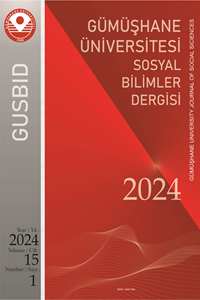Abstract
Dünya düzeni sürekli olarak bir değişim ve dönüşüm halindedir. Tarihsel açıdan bakıldığında yükselen güçlerin hegemonik düzeni değiştirme amacı olmuştur. 1945’li yılların ardından Amerika Birleşik Devletleri, inşa edilen hegemonyanın ana aktörüydü ve 1990 sonrası süreçte tek süper güç olarak kalmıştır. Ancak Batı’daki jeoekonomik ve jeopolitik güç merkezleri, bir süre sonra dünyanın diğer bölgelerine doğru kaymaya başlamıştır. Bu noktada yükselen yeni güç merkezleri, tek hegemonik gücün var olduğu sisteme dair eleştirilerini yükseltmişlerdir. Bu bağlamda günümüzde var olan sistemin değişmesini isteyen aktörler bazında tartışılan kavramlardan biri stratejik özerkliktir. Çalışmada var olan hegemonik düzen ve orta güçlerin dış politikalarında hedef olarak belirledikleri stratejik özerklik ele alınmaktadır. Ayrıca stratejik özerkliğin orta güçler tarafından ABD hegemonyasına karşı bir araç olarak kullanıldığı savunulmaktadır. Konu teorik ve kavramsal yönünün yanı sıra farklı aktörlerin dış politikalarının analizleri kapsamında da incelenmiştir.
Keywords
References
- Abhyankar, R. M. (2018). Indian Diplomacy: Beyond Strategic Autonomy. New Delhi: Oxford University Press.
- Bağcı, H. ve Ç. Kurç. (2016). “Turkey’s strategic choice: buy or make weapons?”. Defence Studies. 17(1), 38–62.
- Balcı, A. (2011). ““Dış Politika”: Yeni Bir Kavramsallaştırma Bağlamında Egemenlik Mitinin Analizi”. Uluslararası İlişkiler. 7(28), 3-29.
- Balci, A. ve N. Miş (2008). “Turkey’s Role in the Alliance of Civilizations: A New Perspective in Turkish Foreign Policy?”, Turkish Studies, 9(3), 387-406
Abstract
The world order is in a state of constant change and transformation. From a historical perspective, rising powers have had the aim of changing the hegemonic order. After 1945, the United States was the main actor of the established hegemony and remained the sole superpower in the post-1990 period. However, the geoeconomic and geopolitical power centers in the West began to shift towards other parts of the world after a while. At this point, rising new power centers have increased their criticism of the system in which there is only one hegemonic power. In this context, one of the concepts discussed on the basis of the actors who want the existing system to change is strategic autonomy. In the study, the existing hegemonic order and the strategic autonomy that middle powers have determined as the target in their foreign policies are discussed. Also, it is argued that strategic autonomy is used by middle power actors as a tool against US hegemony. In addition to its theoretical and conceptual aspects, the subject has also been examined within the scope of the analysis of foreign policies of different actors.
Keywords
References
- Abhyankar, R. M. (2018). Indian Diplomacy: Beyond Strategic Autonomy. New Delhi: Oxford University Press.
- Bağcı, H. ve Ç. Kurç. (2016). “Turkey’s strategic choice: buy or make weapons?”. Defence Studies. 17(1), 38–62.
- Balcı, A. (2011). ““Dış Politika”: Yeni Bir Kavramsallaştırma Bağlamında Egemenlik Mitinin Analizi”. Uluslararası İlişkiler. 7(28), 3-29.
- Balci, A. ve N. Miş (2008). “Turkey’s Role in the Alliance of Civilizations: A New Perspective in Turkish Foreign Policy?”, Turkish Studies, 9(3), 387-406
Details
| Primary Language | Turkish |
|---|---|
| Subjects | European Union, Turkish Foreign Policy, International Relations (Other) |
| Journal Section | Articles |
| Authors | |
| Publication Date | January 31, 2024 |
| Submission Date | October 2, 2023 |
| Published in Issue | Year 2024 Volume: 15 Issue: 1 |

